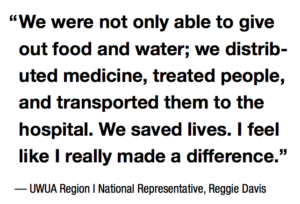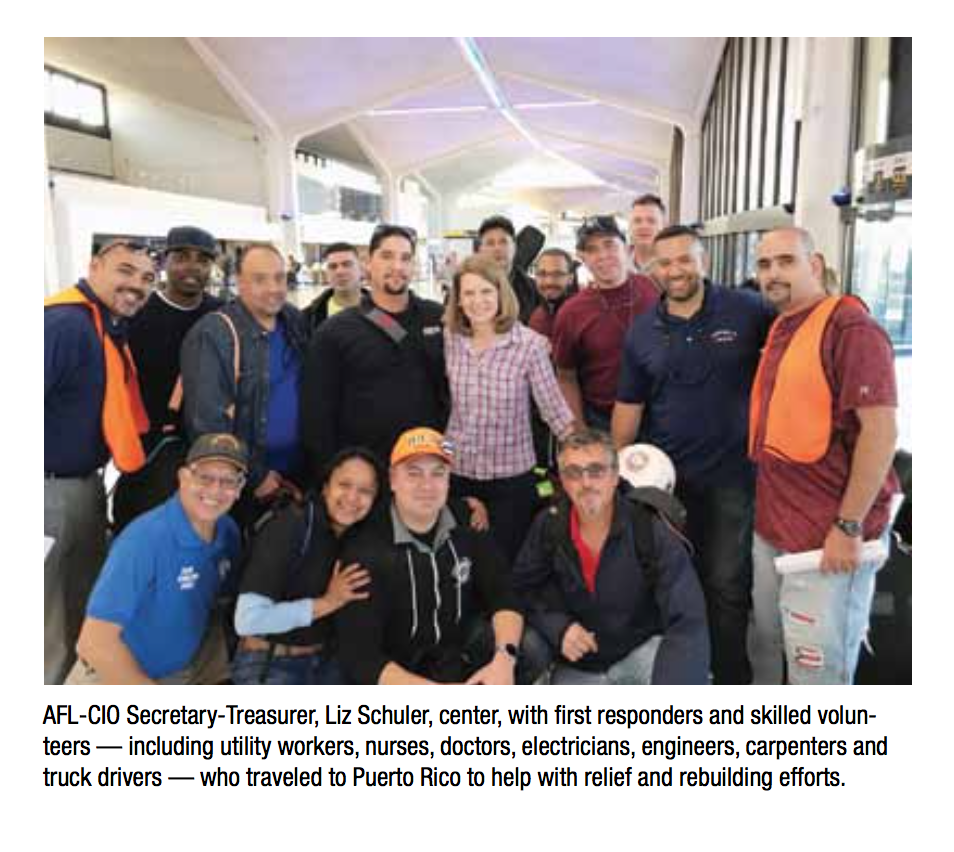UWUA Members Respond to Puerto Rico Emergency
Twenty-five Local 1-2 linemen from Con Ed in New York arrived in Puerto Rico November 10, with more joining them November 21, as part of the massive rebuilding efforts there in the wake of Hurricane Maria. E-Board member William Connolly reports they received their vehicles, have restored power to Old San Juan, and the crews are now continuing their work to bring power back to the island.
Since Hurricane Maria hit the island, the UWUA has taken a number of steps to support the restoration of utility services there.
Four Utility Worker brothers from Local 391, 395 and 423 in New Jersey, were the first UWUA members on the island after they joined more than 300 AFL-CIO volunteers there. The members from American Water NJ were Utility Mechanics Al Archila, Karl Engallena and Jorge Perez and Meter Reader/Field Service Representative Peter Gualtieri.

When UWUA President Mike Langford contacted local union presidents Mike Esposito, Dasher Zsomboran and Dave Quattrone to recruit skilled volunteers to join the delegation of first responders, they stepped up and delivered.
UWUA Region I National Representative Reggie Davis followed the members to Puerto Rico in a show of solidarity and worked to deliver food, water and medical supplies to residents.
“I’m proud of our members for stepping up and responding to the emergency,” said Langford. “This is what we do every day; repair, repower and rebuild American communities. UWUA members get the job done!”
Reggie Davis speaks
Reggie shares some thoughts about a trip he says changed his life.
“People need to know that the situation is much worse than what we see on TV. On TV, you see San Juan, that ‘s the tourist area with all the hotels. They are functioning there. You have to go up into the mountains, where the people who work in those hotels live, and it’s decimated. I don’t think some of those areas are going to come back any time soon.
“We had four volunteers from the water local there. Initially I went to give them support from the National Union. But when I got down there, it was all hands on deck. They didn’t care if I was a senior national rep, president of a local, or a meter reader. You were a warm body and they needed help. From the time I landed on the ground I was packed up with a crew and sent out. I was with nurses and doctors and got to see some of the harshest conditions. We were not only able to give out food and water; we distributed medicine, treated people, and transported them to the hospital. We saved lives. I feel like I really made a difference. 
“As someone who worked in the field, I know that our systems are old and falling apart. We do a lot of Band-Aid work. What’s keeping the system going are the skilled men and women out there working. If it weren’t for them, we’d be in bad shape. If we don’t invest in our infrastructure, there’s going to come a point where even our skilled members are not going to be able to help us.
“You think about these corporate CEOs who get paid all of this money, but when a natural disaster strikes, who’s more valuable to the public, that $20 million CEO who’s sitting up in his penthouse on Park Ave., or is it that $75,000 worker who is in the field putting the lights back on so that people in the hospital can get care, so that children can go to school, so that you can have running water? Who is more valuable?
“When I think about how messed up our priorities are in this country, it’s sad. We have penny-pinching CEOs who will sacrifice health care for the bottom line. They are playing with fire. I’m not just talking about infrastructure, I’m talking about health care, global warming, it’s all coming home to roost. We have to stop and realign our priorities in this country and this world. If we don’t do that we are lost.”

